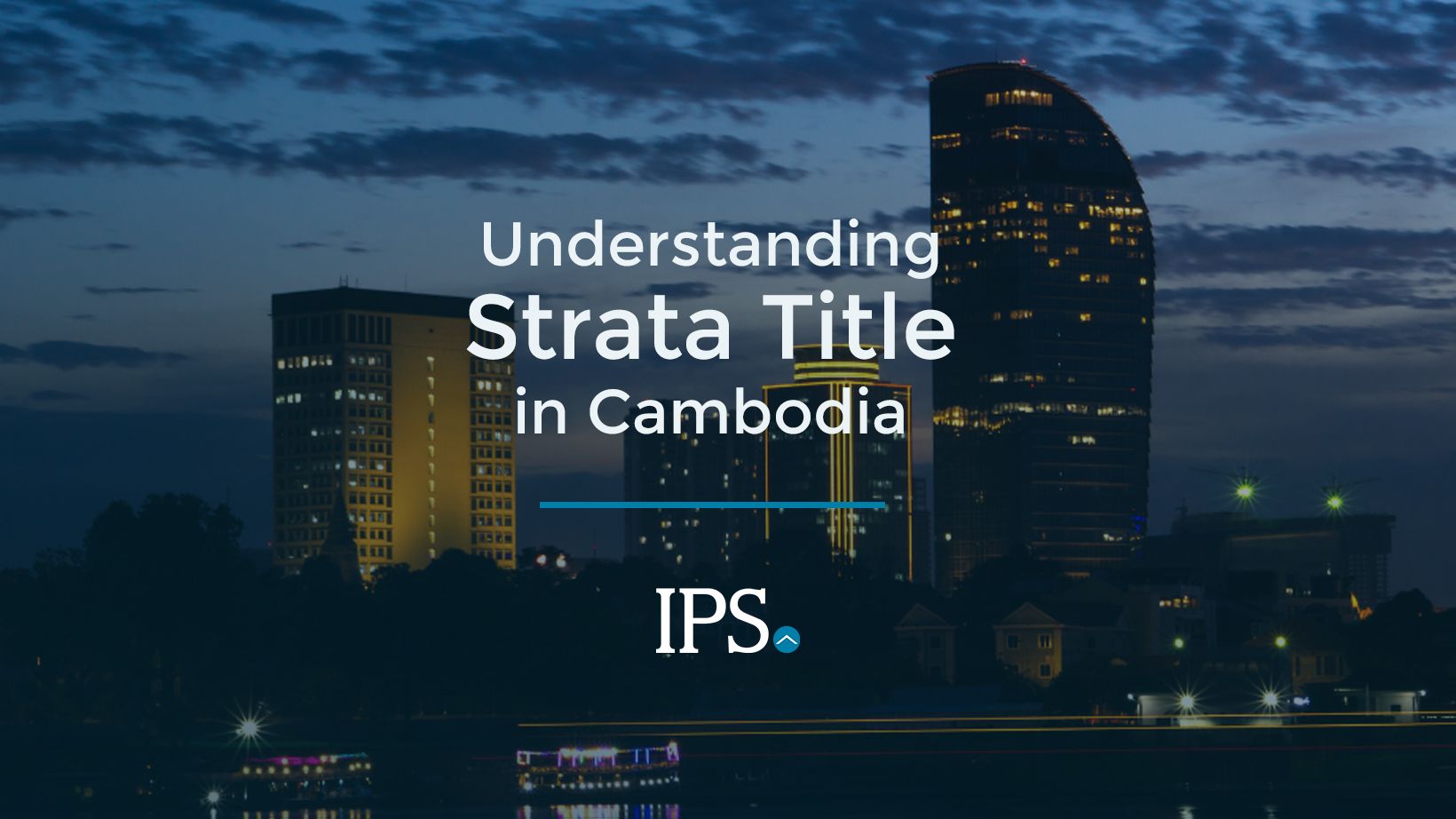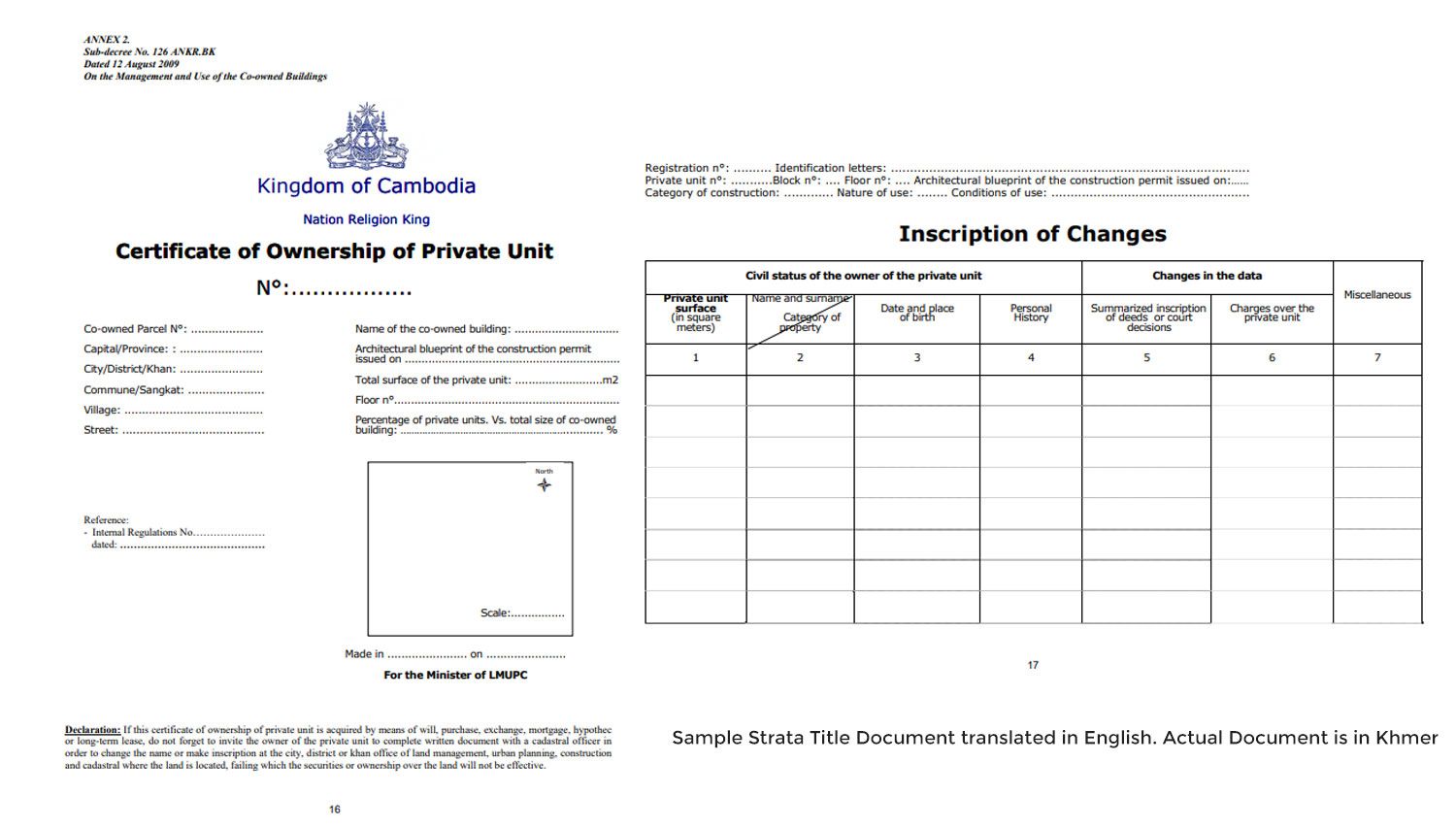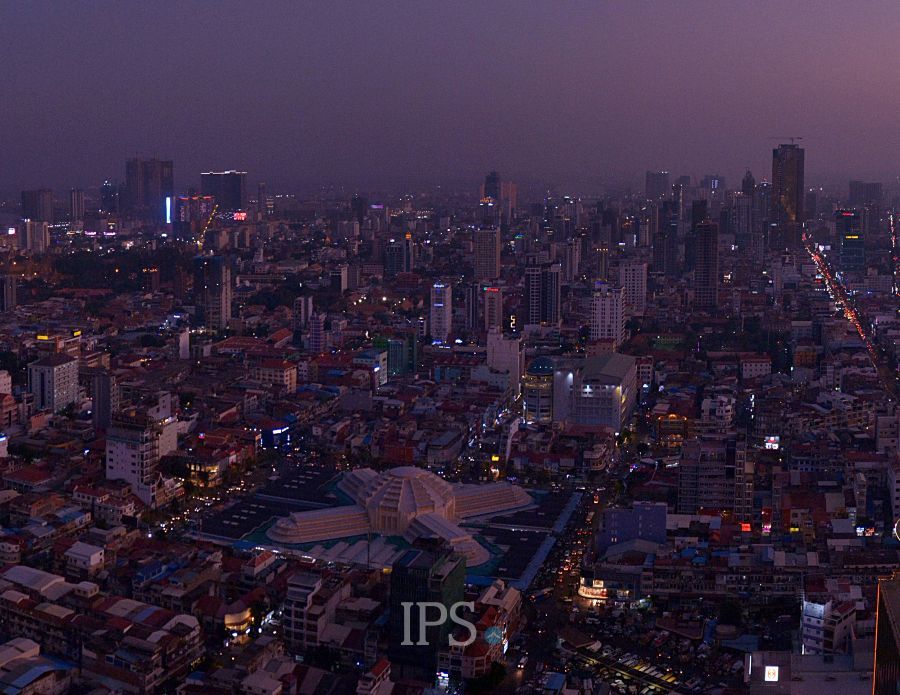Cambodia’s booming real estate market offers a unique opportunity for foreign investors to own private units within co-owned buildings under strata title. Strata title is a form of property ownership that allows individuals, whether Cambodian or foreign, to own private units in multi-story buildings such as condominiums or apartments. This concept is particularly significant in urban areas where high-rise residential buildings are common. In Cambodia, the legal framework supporting strata titles has created opportunities for both local and foreign investors to own property. This article explores the background, benefits, and legal value of Strata Titles in Cambodia.
Background of Strata Title in Cambodia
By law, foreigners are generally prohibited from owning land in Cambodia. However, under the legal framework established by Sub-Decree No. 126 on the Management and Use of Co-Owned Buildings (2009), foreigners can own ‘private units’ within a co-owned building located in the Kingdom of Cambodia, excluding the ground floor and underground floors. This framework provides the basis for strata titles. Additionally, Article 2 of Sub-Decree No. 82, issued on July 29, 2010, permits foreigners to own private units in a co-owned building, provided their ownership does not exceed 70% of the total surface area of all private units within the building. This regulation seeks to balance foreign investment with local ownership, ensuring both can coexist in the property market.
Read: Can Foreigners Own Land in Cambodia? Here’s How.
The Strata Title is typically translated as “The Certificate of Ownership of Private Unit” and includes information such as the co-owned parcel number, the address and the name of the co-owned building, the total surface area of the private unit, the floor number, and the percentage of the private unit in relation to the total size of the co-owned building, as well as details about the private unit owner.
Benefits of Strata Title holders
- Ownership of a Defined Space: Strata title holders own their specific unit within a larger complex, allowing them to have full control over their property, including the ability to sell, lease, or modify it (within certain regulations).
- Shared Ownership of Common Areas: Alongside individual ownership, strata title holders share ownership of common areas like gardens, swimming pools, gyms, and car parks. This shared ownership means that the cost of maintaining these areas is shared among all owners, often resulting in higher quality and well-maintained amenities.
- Affordability: Strata-titled properties are often more affordable than standalone homes, providing an entry point into the property market, especially in urban areas where land prices are high.
- Community Living: Strata living can foster a sense of community among residents, with opportunities for social interactions and activities. There are often community rules and by-laws that help maintain a peaceful living environment.
- Maintenance and Management: Strata title properties are managed by a body corporate (also known as an owners’ corporation) which takes care of the maintenance of the building and common areas. This can include cleaning, landscaping, and repairs, relieving individual owners of these responsibilities.
- Enhanced Security: Many strata complexes offer enhanced security features such as gated access, security cameras, and onsite security personnel, contributing to a safer living environment.
- Investment Potential: Strata-titled properties can be a good investment opportunity due to their lower entry costs and potential for rental income. Well-maintained common areas and amenities can also increase the attractiveness and value of the property.
- Regulated Environment: Strata title ownership is regulated by specific legislation which provides a framework for resolving disputes, managing common property, and ensuring that owners’ rights and obligations are clear.
- Professional Management: Many strata properties are managed by professional property managers, ensuring that the complex is well maintained and that the value of the property is preserved over time.
Several off-plan properties that we recommend in Cambodia are offering strata titles, making it easier for investors to secure ownership in exciting new developments. Notable projects include J Tower 3, Time Square, and Odom in Phnom Penh and for Siem Reap, Rose Apple Square, and Angkor Grace.
Legal Value of Strata Title
The legal value of strata titles in Cambodia is recognized and protected under the “Civil Code 2007” and “Sub Decree on the Management and Use of Co-owned Buildings.” These regulations establish a comprehensive framework for the ownership, management, and use of co-owned properties, ensuring that strata title holders have clear and enforceable rights.
- Recognition of Ownership: Strata title is legally recognized as a form of property ownership. Titleholders have full ownership rights to their private units, similar to freehold property. This includes the right to sell, lease, or transfer the property.
- Registration: Strata titles must be registered with the Ministry of Land Management, Urban Planning, and Construction (MLMUPC). This registration provides legal certainty and protection to the titleholder, as it is recorded in the official land registry.
- Transferability: Strata titles can be bought, sold, and transferred like any other form of property. The ownership transfer process is legally recognized and must be conducted through the appropriate legal and administrative channels.
- Legal Protections: Strata titleholders have legal protection against unauthorized alterations, encroachments, or misuse of their units or common areas. The law provides mechanisms for resolving disputes between unit owners and the management committee.
- Mortgage and Collateral: Strata titles can be used as collateral for securing loans and mortgages, adding significant financial value and flexibility to the ownership of strata-titled units.
- Foreign Ownership: The law permits foreign ownership of strata-titled units, up to 70% of the total units in a co-owned building. This provision enhances the legal value of strata titles by attracting foreign investment and increasing demand for such properties.
- Common Area Management: The regulation mandates the establishment of a management committee to oversee the maintenance and management of common areas, ensuring the property is managed in a manner that maintains its value and protects the interests of all unit owners.
- Dispute Resolution: The regulation provides mechanisms for resolving disputes related to strata-titled properties, including issues related to management, maintenance, and usage of common areas. This legal framework helps maintain harmony and protect the rights of all parties involved.
In overview, strata titles in Cambodia offer a robust and legally protected form of property ownership, attracting both local and foreign investors. The legal framework ensures that individual unit owners have clear rights, proper management of common areas, and the ability to transfer and use their properties in financial transactions. This has significant implications for urban development and the growth of Cambodia’s real estate market.
If you are interested in tapping into Cambodia’s thriving real estate market and securing a valuable investment, look no further than IPS. With our expertise and deep understanding of the local market, we are committed to guiding you through every step of the process, ensuring a seamless and rewarding experience. Contact us today!
• Introduction to Cambodia
» Introduction to Phnom Penh
» Introduction to Siem Reap
» Monarchy & Government
• Tourism & Residency
» Thriving Tourism Industry
» Visas in Cambodia
• Healthcare & Education
» Healthcare in Cambodia
» Education in Cambodia
» International Schools in Cambodia
• Technology
» The Rise of Technology in Cambodia
• Why invest in property in Cambodia?
• Why Invest in Condominiums?
» Condo Ownership Journey in Cambodia
• Why Phnom Penh is SEA’s New Real Estate Hotspot
• Cambodian Property Tax Guide
• Can Foreigners Own Land in Cambodia?
• Understanding Cambodian Property Titles
» Strata Title: Background, Benefits, Legal Value
• The IPS Cambodia Advantage
» Why Choose IPS?



